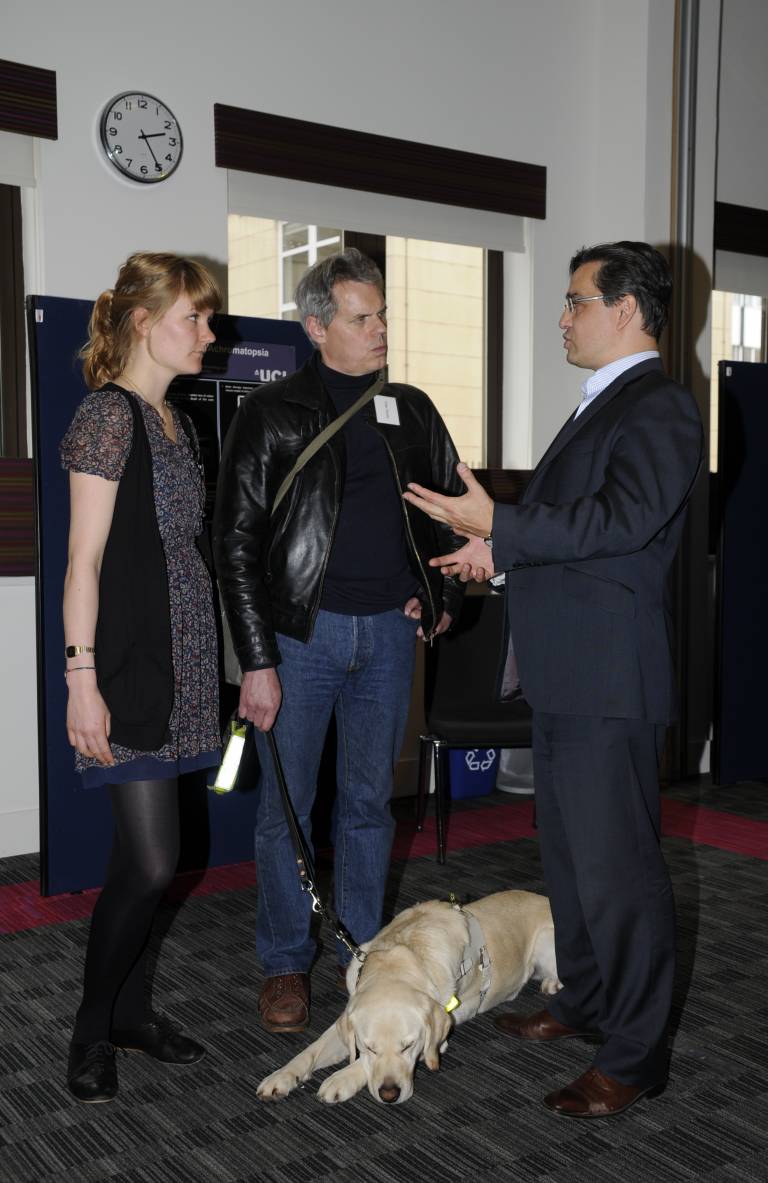Retina Day 2012
Saturday 21st April 2012 (10am - 5pm); etc.venues, Prospero House, 241 Borough High Street, London, SE1 1GA

6 August 2019
Introduction
Over the last 20 years, laboratory-based scientific research has led to a huge increase in our understanding of the genetic causes of Retinitis Pigmentosa (RP) and other closely related conditions such as Macular Degeneration (MD). In addition to many of the genes underlying RP and MD having been identified, much has also been learned about the mechanisms by which these faulty genes cause retinal degeneration. This knowledge has now started to be applied to the development of potential therapies.
We are now in an exciting era where research efforts are concentrated in establishing effective treatments for RP and MD. Multiple avenues of research are being investigated. The various strategies being studied include Gene Therapy, Stem Cell Therapy, Growth Factors, and Artificial Vision. Several trials have recently commenced and there is a need to inform patients about developments and also to make them wary of the increasing number of unsubstantiated claims of cures in various places around the world.
Retina Day
We held the first “Retina Patient Day” in London on April 21st 2012. Over 250 people with retinal degeneration and their family members met with more than 40 clinicians and scientists from UCL Institute of Ophthalmology Department of Genetics and Moorfields Eye Hospital Biomedical Research Centre for Ophthalmology, who provided updates on their research into developing effective treatments for blinding retinal conditions.
We began the day with a series of short talks delivered by the senior investigators leading the research effort. Professors Robin Ali, James Bainbridge and Tony Moore were joined by Drs. Lyndon da Cruz, Michel Michaelides, Rachael Pearson and Andrew Webster in setting out how laboratory and clinical studies are rapidly enhancing our understanding of how best to treat inherited diseases that cause blindness.
Our researchers spoke about how the advances we have made in basic science are gradually being translated into clinical trials – we told the attendees that with further rigorous work more effective treatments could be developed in time. As part of our event, Jenny Wright, MA, Ph.D. research student University of the Arts, London, encouraged patients, carers and healthcare professionals to produce drawings of their impressions of the disease. Jenny’s report including some of the artwork can be viewed by clicking the link below.
Attendees at the Retina Patient Day appreciated the unique opportunity to interact with dozens of our clinicians and scientists, which we arranged in four broad ways: information stalls, a chance to ‘meet the doctor’, ‘meet the scientist’ and ‘meet the counsellor,’ an artist’s workshop, and most importantly, over 30 poster presentations explaining our research in terms that attendees could relate to. Our researchers presented their posters and explained how their area of research fits into the broader effort of seeking therapies for visual disorders; they answered many excellent questions put to them by the attendees, who were keen to understand more about their conditions and about the research into treatments.
This opportunity to engage with scientists at the forefront of delivering innovative therapies is not often afforded to people with vision loss, and the interaction proved very welcome.
Following these fruitful and energetic interactive sessions, we brought to a close with an insight into the work of RP Fighting Blindness and Moorfields Eye Charity, two of the organisations whose generous support make the research being discussed (and the awareness day itself) possible. Attendees were also given an opportunity throughout the day to meet fellow patients and share experiences, submit questions to the lead investigators – these questions covered a range of topics and were answered by our panel of experts in the final plenary session.
Our Retina Patient Day 2012 proved an excellent opportunity for patients with retinal degeneration and their families to engage with researchers involved in developing new treatments. Commenting on the day, Prof. Robin Ali, Head of Department of Genetics and the BRC Gene Therapy Theme leader, said “The day has been a great success. We aim to hold a “Retina Patient Day” every year. Patient engagement is an essential part of developing an effective translational research programme. Our team not only look forward to further opportunities to explain our work to patients and their families, but to involve and learn from those who may benefit from it in the future.”
Some feedback from attendees
‘Very enlightening and educational, really delighted this patient day has been put on. Worth travelling from S.Wales!!!’
‘Extremely informative, one to one discussions with the professionals. Definitely will come again’
‘Well organised event with very helpful speakers. Like the poster rooms for specific questions’
 Close
Close

